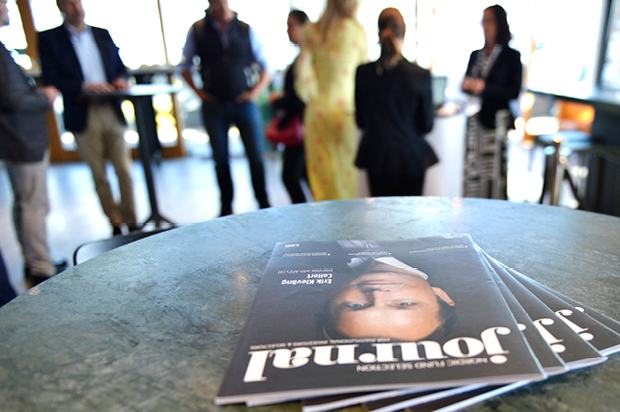
Office challenges and opportunities in a more difficult market
Earlier this fall, Tell Media Group, in cooperation with JPMorgan Asset Management, Nuveen and Principal Asset Management, organised a roundtable discussion at Hotel d’Angleterre in Copenhagen focusing on real estate investments. Tell Media Group founder Niklas Tell and Nordic Fund Selection Journal editor Caroline Liinanki moderated the discussion.
The discussion started out with Caroline Liinanki pointing out that real estate has been an asset class that has been performing very well for a long time but asking how concerned real investors should be at the moment in light of all the uncertainties.
MICHAEL NEAL: “It’s interesting what you say about real estate having done well for a long time, which it did along with a lot of other asset classes. We got used to low interest rates and the cost of debt was helpful for real estate and investors were also looking to real estate to get the returns they didn’t get in fixed income. People almost forgot that real estate is cyclical. What we’ve been through now is a significant increase in interest rates and the cost of capital together with structural change in the market. That, of course, changes everything and it’s something that we were used to seeing some 10 to 15 years ago but got used to a market driven by monetary stimulus. It has an impact short term and it will be an adjustment phase to get relative values to where they should be. We’re a long way through that but we’re not done.”
PAUL KENNEDY: “I would just like to expand on what Michael said about investors going through a period with exceptionally low bond yields. Yes, it did lead investors to look to real estate to get the income they didn’t get from fixed income and that trend is now reversing when you do get an income from bonds. However, we need to remember that during this period, more investors have got used to and have got experience from a range of private market investments that they didn’t have before. That does not go away. Also, I think it’s important to look at the long-term trend of bond yields. We got very low bond yields following the global financial crisis and that has now reversed but the long-term trend of bond yields is that they are likely to remain relatively low.”
NIKLAS TELL: WHAT DOES THIS MEAN FOR THE ALLOCATION TO REAL ESTATE? SHOULD YOU HAVE MORE ALLOCATED TO REAL ESTATE THAN PRIOR TO THE FINANCIAL CRISIS BUT MAYBE LESS THAN WHEN INTEREST RATES WERE ZERO?
PAUL KENNEDY: “Yes. That would be my conclusion. One of the constraints when it comes to allocating to private markets is that they’re difficult for a range of reasons. It requires a different skillset and on top of that, it’s also more difficult to invest a billion in real estate than a billion in bonds or equities. However, once investors have that structure in place and once they’re used to investing in these asset classes, they will continue thanks to the diversification and alpha benefits.”
RUSSELL A. BEECHER: “I would agree with that. What you said about the acceptance of the asset class is valid and I think that’s here to stay. Also, even if the income part of real estate has lost some of it’s benefits with higher interest rates, I think your alpha comment is an important one. I think we’re in a good position right now for those looking to continue to invest and generate alpha.”
NIKLAS TELL: I WOULD LIKE TO COME BACK TO CAROLINES ORIGINAL QUESTION ON HOW WORRIED REAL ESTATE INVESTORS SHOULD BE RIGHT NOW.
MICHAEL NEAL: “There are a lot of uncertainties today, which means reduced liquidity and elevated risk premiums. But I would argue that we see opportunities today. Not across all of real estate but we’re starting to see deals with very attractive characteristics. It’s also important to remember that when sentiment changes, it changes quickly. I therefore think it’s important for investors to ensure that they’re ready to invest, even if they’re not ready to deploy capital today. In order to have the optionality to invest, they should be looking to build relationships and raise the capital to ensure they have resources and relationships in place for future deployment.”
RUSSELL A. BEECHER: “I agree. The window will close quickly and there are already opportunistic returns to be had today. If we look at the US market specifically, with USD 1.9 trillion of debt maturing over the next three years, and a high percentage of that floating rate, I think we will see increased stress within the capital stack resulting in a lot of opportunities. I also think that the concern over the US REIT market is overdone and that it’s well positioned to generate strong returns when sentiment changes.”
LAURA ROBIN: “I think Paul’s comment that investors used to look to real estate to replace fixed income is a valid one. However, what I hear now is if we haven’t invested in real estate, why should we start now that we actually receive an income from fixed income? I do think we will see a re-pricing and that there will be opportunities to build an exposure to real estate next year. I therefore want to be flexible in my fixed income allocation to be able to use some of that if we see opportunities in real estate in the next six to nine months.”
The roundtable discussion was published in issue 05, 2023 of Nordic Fund Selection Journal. A PDF of the complete story can be found here.
//Participants
- LAURA ROBIN, Finance specialist, Treasury, United Nations Office for Project Services
- RUSSELL A. BEECHER, Managing director – acquisitions/dispositions at Principal Asset Management
- PAUL KENNEDY, Portfolio manager, Strategic Property Fund, Europe at JPMorgan Asset Management
- MICHAEL NEAL, CIO and head of funds management EMEA at Nuveen



